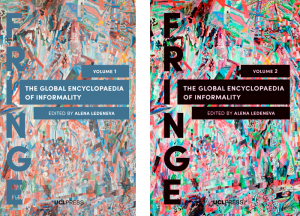Mapping informality
21 February 2019
The Global Informality Project is a research project aimed at collecting studies on informal practices and structures around the globe. Launched in 2014, the database is available online at www.in-formality.com and is searchable by region, country, keyword or type of practice. More than 250 scholars from 70 countries have already participated in the Project by submitting their work to the online platform, enabling readers to better comprehend the unwritten rules, or “ways of getting things done”, in their countries or region.
 These practices are presented in clusters, according to their similarities, in the two volumes of The Global Encyclopaedia of Informality that is published by the UCL Press in open access – a free, unrestricted online access system. These volumes include practices that are common, familiar and taken for granted, but also uncomfortable to discuss. They range from emotion-driven exchanges of gifts or favours, tributes for services, and identity- or value-based practices of solidarity (Volume 1), to informal welfare, informal employment and entrepreneurship, and the power-driven forms of co-optation and control (Volume 2).
These practices are presented in clusters, according to their similarities, in the two volumes of The Global Encyclopaedia of Informality that is published by the UCL Press in open access – a free, unrestricted online access system. These volumes include practices that are common, familiar and taken for granted, but also uncomfortable to discuss. They range from emotion-driven exchanges of gifts or favours, tributes for services, and identity- or value-based practices of solidarity (Volume 1), to informal welfare, informal employment and entrepreneurship, and the power-driven forms of co-optation and control (Volume 2).
The paradox is that informal practices are invisible to the outsider or the lay public but ubiquitous. Expertly practised by insiders, but often hidden from outsiders, informal practices are, as this Encyclopaedia shows, deeply rooted all over the world. Fostering informal ties with kumstvo or “godfathers” in Montenegro, hyvä veli or “dear brothers” in Finland, and vetterliwirtschaft or “little cousins” in Switzerland can make a world of difference to one’s wellbeing. Yet just like family relations, social ties not only enable but also limit individual decisions, behaviour and rights, as revealed in the research articles on janteloven (aversion to individuality) in Denmark, Norway and Sweden, or krugovaya poruka (joint responsibility) in Russia and across Europe.
The Project enables practices from all over the world to be compared, and also questions common assumptions about informality, reframing in particular its links to corruption, poverty and development, and morality and oppressive regimes. It highlights the role of ambivalence and complexity in the workings of human societies, and illustrates the potential of ‘network expertise’ that is cross-disciplinary, as well as cross-area inquiry enabled by the network of researchers. Where the disciplinary methods tend to focus selectively on political, economic or social aspects, the ‘networked’ perspective provides insights into the complexity of the forces at play.
Moreover, the Project is of great interest to policymakers who want to imagine solutions that are beneficial for all, but sufficiently pragmatic to ensure seamless implementation, particularly in the field of cross-border trade in developing countries. The Project is supported by UCL research funds and the European Commission’s Framework 7 and Horizon 2020 funding programmes for research, innovation and technological development (ANTICORRP and INFORM).
More information
www.in-formality.com
informality2014@gmail.com